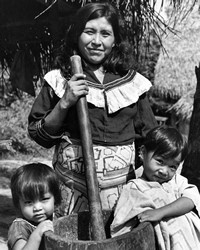Yine in Peru

Photo Source:
Anonymous
|
Send Joshua Project a map of this people group.
|
| People Name: | Yine |
| Country: | Peru |
| 10/40 Window: | No |
| Population: | 5,500 |
| World Population: | 5,500 |
| Primary Language: | Yine |
| Primary Religion: | Ethnic Religions |
| Christian Adherents: | 8.00 % |
| Evangelicals: | 7.00 % |
| Scripture: | New Testament |
| Ministry Resources: | Yes |
| Jesus Film: | Yes |
| Audio Recordings: | Yes |
| People Cluster: | South American Indigenous |
| Affinity Bloc: | Latin-Caribbean Americans |
| Progress Level: |
|
Introduction / History
The Yine are said to have had an advanced prehistoric society that traded with the Incan Empire. In the 17th century, the Jesuit and Franciscan monks established several missions among the Yine. However, the Yine resisted both Catholic and Adventist influence and continued to live in relative isolation until the rubber boom at the turn of the 20th century, when catastrophic violence and enslavement uprooted their society. After the fall of the rubber industry, the Yines suffered again under a debt system imposed on them by plantation landowners.
SIL began working with the Yine in the 1940s and completed the New Testament translation in 1955. Various mission organizations helped develop local church leaders until the Yine church became one of the most mature and active indigenous churches in the Peruvian Amazon in the 1990s. Over the last two decades, however, the Yine church has suffered a severe spiritual falling out. Many churches disbanded as believers struggle to understand and apply the Bible to their daily lives.
Where Are they Located?
The Yine live in the central jungle region of Peru along the Urubamba River.
What Are Their Lives Like?
The Yine live an agrarian lifestyle based on farming, fishing, and hunting. They raise over sixty kinds of produce both to eat and to sell. Principal crops include manioc, plantains, rice, maize, yams, beans, and cotton. Fishing and hunting supply much of their diet, and they raise commercial livestock like cattle. They have one of the higher rates of education among Peruvian Amazon tribes, with a literacy rate of 75% and 56 indigenous teachers serving in local schools.
Traditionally, Yine men wore cotton robes with hand-painted geometric designs, while the women wore wraparound skirts. Today, most people wear modern clothing. Because of a historically matriarchal culture, they have much greater gender equality than do many surrounding tribes.
Due to their fishing and boating expertise, the Yine build their communities on the shorelines of large rivers. Yine houses are elevated a few feet above the ground and have thatch roofs, palm-bark floors, and either no walls or simple walls of bark or wood. Artistic products include pottery, baskets, woven clothing, beadwork, and seats carved in the shape of a turtle.
What Are Their Beliefs?
The Yine hold to an animistic worldview that seeks to discover spiritual causes for life problems and resolve them through shamanistic rituals. They believe that the cosmos is made of many overlapping worlds that can be perceived and navigated by the shaman, who functions as a helpful bridge between the material and the spiritual worlds. Because mysterious evil spirits abound, often hidden behind ordinary plants and animals, the shaman must frequently take the hallucinogenic ayahuasca drug to enter into contact with the spirit world and discover both causes and solutions to problems like death, illness, and hunger.
What Are Their Needs?
Believers have access to occasional Christian conferences but lack regular life discipleship in their home environment. They need a solid biblical foundation and discernment to distinguish between true and false teachers.
Historically, missionaries have predominantly focused on men with no special emphasis on teaching and training women, so many women have turned aside to follow false teachers. Yine women need female mentoring, teaching, and training.
Prayer Points
Please pray for the Yine church to experience a revival and reawakening, with new converts and previous believers returning to the Lord.
Pray for existing Yine churches to discern truth from error and reject false teachers.
Pray that Yine believers will be discipled and become mature in the faith.
Pray for ministry to empower Yine women to teach and encourage other women.
Pray that the Yine will face cultural changes with wisdom and preparation and find new ways to integrate their traditional way of life into an increasingly monetized society.